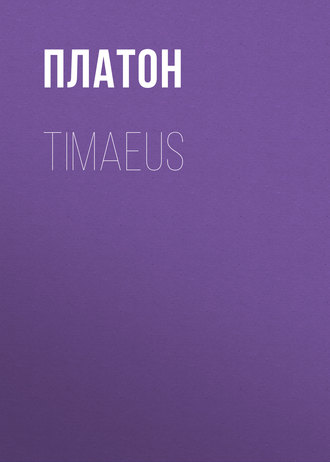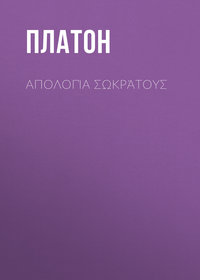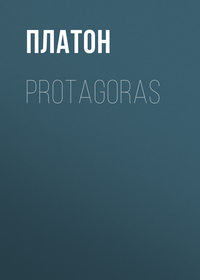 полная версия
полная версияTimaeus
The greatest 'divination' of the ancients was the supremacy which they assigned to mathematics in all the realms of nature; for in all of them there is a foundation of mechanics. Even physiology partakes of figure and number; and Plato is not wrong in attributing them to the human frame, but in the omission to observe how little could be explained by them. Thus we may remark in passing that the most fanciful of ancient philosophies is also the most nearly verified in fact. The fortunate guess that the world is a sum of numbers and figures has been the most fruitful of anticipations. The 'diatonic' scale of the Pythagoreans and Plato suggested to Kepler that the secret of the distances of the planets from one another was to be found in mathematical proportions. The doctrine that the heavenly bodies all move in a circle is known by us to be erroneous; but without such an error how could the human mind have comprehended the heavens? Astronomy, even in modern times, has made far greater progress by the high a priori road than could have been attained by any other. Yet, strictly speaking – and the remark applies to ancient physics generally – this high a priori road was based upon a posteriori grounds. For there were no facts of which the ancients were so well assured by experience as facts of number. Having observed that they held good in a few instances, they applied them everywhere; and in the complexity, of which they were capable, found the explanation of the equally complex phenomena of the universe. They seemed to see them in the least things as well as in the greatest; in atoms, as well as in suns and stars; in the human body as well as in external nature. And now a favourite speculation of modern chemistry is the explanation of qualitative difference by quantitative, which is at present verified to a certain extent and may hereafter be of far more universal application. What is this but the atoms of Democritus and the triangles of Plato? The ancients should not be wholly deprived of the credit of their guesses because they were unable to prove them. May they not have had, like the animals, an instinct of something more than they knew?
Besides general notions we seem to find in the Timaeus some more precise approximations to the discoveries of modern physical science. First, the doctrine of equipoise. Plato affirms, almost in so many words, that nature abhors a vacuum. Whenever a particle is displaced, the rest push and thrust one another until equality is restored. We must remember that these ideas were not derived from any definite experiment, but were the original reflections of man, fresh from the first observation of nature. The latest word of modern philosophy is continuity and development, but to Plato this is the beginning and foundation of science; there is nothing that he is so strongly persuaded of as that the world is one, and that all the various existences which are contained in it are only the transformations of the same soul of the world acting on the same matter. He would have readily admitted that out of the protoplasm all things were formed by the gradual process of creation; but he would have insisted that mind and intelligence – not meaning by this, however, a conscious mind or person – were prior to them, and could alone have created them. Into the workings of this eternal mind or intelligence he does not enter further; nor would there have been any use in attempting to investigate the things which no eye has seen nor any human language can express.
Lastly, there remain two points in which he seems to touch great discoveries of modern times – the law of gravitation, and the circulation of the blood.
(1) The law of gravitation, according to Plato, is a law, not only of the attraction of lesser bodies to larger ones, but of similar bodies to similar, having a magnetic power as well as a principle of gravitation. He observed that earth, water, and air had settled down to their places, and he imagined fire or the exterior aether to have a place beyond air. When air seemed to go upwards and fire to pierce through air – when water and earth fell downward, they were seeking their native elements. He did not remark that his own explanation did not suit all phenomena; and the simpler explanation, which assigns to bodies degrees of heaviness and lightness proportioned to the mass and distance of the bodies which attract them, never occurred to him. Yet the affinities of similar substances have some effect upon the composition of the world, and of this Plato may be thought to have had an anticipation. He may be described as confusing the attraction of gravitation with the attraction of cohesion. The influence of such affinities and the chemical action of one body upon another in long periods of time have become a recognized principle of geology.
(2) Plato is perfectly aware – and he could hardly be ignorant – that blood is a fluid in constant motion. He also knew that blood is partly a solid substance consisting of several elements, which, as he might have observed in the use of 'cupping-glasses', decompose and die, when no longer in motion. But the specific discovery that the blood flows out on one side of the heart through the arteries and returns through the veins on the other, which is commonly called the circulation of the blood, was absolutely unknown to him.
A further study of the Timaeus suggests some after-thoughts which may be conveniently brought together in this place. The topics which I propose briefly to reconsider are (a) the relation of the Timaeus to the other dialogues of Plato and to the previous philosophy; (b) the nature of God and of creation (c) the morality of the Timaeus: —
(a) The Timaeus is more imaginative and less scientific than any other of the Platonic dialogues. It is conjectural astronomy, conjectural natural philosophy, conjectural medicine. The writer himself is constantly repeating that he is speaking what is probable only. The dialogue is put into the mouth of Timaeus, a Pythagorean philosopher, and therefore here, as in the Parmenides, we are in doubt how far Plato is expressing his own sentiments. Hence the connexion with the other dialogues is comparatively slight. We may fill up the lacunae of the Timaeus by the help of the Republic or Phaedrus: we may identify the same and other with the (Greek) of the Philebus. We may find in the Laws or in the Statesman parallels with the account of creation and of the first origin of man. It would be possible to frame a scheme in which all these various elements might have a place. But such a mode of proceeding would be unsatisfactory, because we have no reason to suppose that Plato intended his scattered thoughts to be collected in a system. There is a common spirit in his writings, and there are certain general principles, such as the opposition of the sensible and intellectual, and the priority of mind, which run through all of them; but he has no definite forms of words in which he consistently expresses himself. While the determinations of human thought are in process of creation he is necessarily tentative and uncertain. And there is least of definiteness, whenever either in describing the beginning or the end of the world, he has recourse to myths. These are not the fixed modes in which spiritual truths are revealed to him, but the efforts of imagination, by which at different times and in various manners he seeks to embody his conceptions. The clouds of mythology are still resting upon him, and he has not yet pierced 'to the heaven of the fixed stars' which is beyond them. It is safer then to admit the inconsistencies of the Timaeus, or to endeavour to fill up what is wanting from our own imagination, inspired by a study of the dialogue, than to refer to other Platonic writings, – and still less should we refer to the successors of Plato, – for the elucidation of it.
More light is thrown upon the Timaeus by a comparison of the previous philosophies. For the physical science of the ancients was traditional, descending through many generations of Ionian and Pythagorean philosophers. Plato does not look out upon the heavens and describe what he sees in them, but he builds upon the foundations of others, adding something out of the 'depths of his own self-consciousness.' Socrates had already spoken of God the creator, who made all things for the best. While he ridiculed the superficial explanations of phenomena which were current in his age, he recognised the marks both of benevolence and of design in the frame of man and in the world. The apparatus of winds and waters is contemptuously rejected by him in the Phaedo, but he thinks that there is a power greater than that of any Atlas in the 'Best' (Phaedo; Arist. Met.). Plato, following his master, affirms this principle of the best, but he acknowledges that the best is limited by the conditions of matter. In the generation before Socrates, Anaxagoras had brought together 'Chaos' and 'Mind'; and these are connected by Plato in the Timaeus, but in accordance with his own mode of thinking he has interposed between them the idea or pattern according to which mind worked. The circular impulse (Greek) of the one philosopher answers to the circular movement (Greek) of the other. But unlike Anaxagoras, Plato made the sun and stars living beings and not masses of earth or metal. The Pythagoreans again had framed a world out of numbers, which they constructed into figures. Plato adopted their speculations and improved upon them by a more exact knowledge of geometry. The Atomists too made the world, if not out of geometrical figures, at least out of different forms of atoms, and these atoms resembled the triangles of Plato in being too small to be visible. But though the physiology of the Timaeus is partly borrowed from them, they are either ignored by Plato or referred to with a secret contempt and dislike. He looks with more favour on the Pythagoreans, whose intervals of number applied to the distances of the planets reappear in the Timaeus. It is probable that among the Pythagoreans living in the fourth century B.C., there were already some who, like Plato, made the earth their centre. Whether he obtained his circles of the Same and Other from any previous thinker is uncertain. The four elements are taken from Empedocles; the interstices of the Timaeus may also be compared with his (Greek). The passage of one element into another is common to Heracleitus and several of the Ionian philosophers. So much of a syncretist is Plato, though not after the manner of the Neoplatonists. For the elements which he borrows from others are fused and transformed by his own genius. On the other hand we find fewer traces in Plato of early Ionic or Eleatic speculation. He does not imagine the world of sense to be made up of opposites or to be in a perpetual flux, but to vary within certain limits which are controlled by what he calls the principle of the same. Unlike the Eleatics, who relegated the world to the sphere of not-being, he admits creation to have an existence which is real and even eternal, although dependent on the will of the creator. Instead of maintaining the doctrine that the void has a necessary place in the existence of the world, he rather affirms the modern thesis that nature abhors a vacuum, as in the Sophist he also denies the reality of not-being (Aristot. Metaph.). But though in these respects he differs from them, he is deeply penetrated by the spirit of their philosophy; he differs from them with reluctance, and gladly recognizes the 'generous depth' of Parmenides (Theaet.).
There is a similarity between the Timaeus and the fragments of Philolaus, which by some has been thought to be so great as to create a suspicion that they are derived from it. Philolaus is known to us from the Phaedo of Plato as a Pythagorean philosopher residing at Thebes in the latter half of the fifth century B.C., after the dispersion of the original Pythagorean society. He was the teacher of Simmias and Cebes, who became disciples of Socrates. We have hardly any other information about him. The story that Plato had purchased three books of his writings from a relation is not worth repeating; it is only a fanciful way in which an ancient biographer dresses up the fact that there was supposed to be a resemblance between the two writers. Similar gossiping stories are told about the sources of the Republic and the Phaedo. That there really existed in antiquity a work passing under the name of Philolaus there can be no doubt. Fragments of this work are preserved to us, chiefly in Stobaeus, a few in Boethius and other writers. They remind us of the Timaeus, as well as of the Phaedrus and Philebus. When the writer says (Stob. Eclog.) that all things are either finite (definite) or infinite (indefinite), or a union of the two, and that this antithesis and synthesis pervades all art and nature, we are reminded of the Philebus. When he calls the centre of the world (Greek), we have a parallel to the Phaedrus. His distinction between the world of order, to which the sun and moon and the stars belong, and the world of disorder, which lies in the region between the moon and the earth, approximates to Plato's sphere of the Same and of the Other. Like Plato (Tim.), he denied the above and below in space, and said that all things were the same in relation to a centre. He speaks also of the world as one and indestructible: 'for neither from within nor from without does it admit of destruction' (Tim). He mentions ten heavenly bodies, including the sun and moon, the earth and the counter-earth (Greek), and in the midst of them all he places the central fire, around which they are moving – this is hidden from the earth by the counter-earth. Of neither is there any trace in Plato, who makes the earth the centre of his system. Philolaus magnifies the virtues of particular numbers, especially of the number 10 (Stob. Eclog.), and descants upon odd and even numbers, after the manner of the later Pythagoreans. It is worthy of remark that these mystical fancies are nowhere to be found in the writings of Plato, although the importance of number as a form and also an instrument of thought is ever present to his mind. Both Philolaus and Plato agree in making the world move in certain numerical ratios according to a musical scale: though Bockh is of opinion that the two scales, of Philolaus and of the Timaeus, do not correspond…We appear not to be sufficiently acquainted with the early Pythagoreans to know how far the statements contained in these fragments corresponded with their doctrines; and we therefore cannot pronounce, either in favour of the genuineness of the fragments, with Bockh and Zeller, or, with Valentine Rose and Schaarschmidt, against them. But it is clear that they throw but little light upon the Timaeus, and that their resemblance to it has been exaggerated.
That there is a degree of confusion and indistinctness in Plato's account both of man and of the universe has been already acknowledged. We cannot tell (nor could Plato himself have told) where the figure or myth ends and the philosophical truth begins; we cannot explain (nor could Plato himself have explained to us) the relation of the ideas to appearance, of which one is the copy of the other, and yet of all things in the world they are the most opposed and unlike. This opposition is presented to us in many forms, as the antithesis of the one and many, of the finite and infinite, of the intelligible and sensible, of the unchangeable and the changing, of the indivisible and the divisible, of the fixed stars and the planets, of the creative mind and the primeval chaos. These pairs of opposites are so many aspects of the great opposition between ideas and phenomena – they easily pass into one another; and sometimes the two members of the relation differ in kind, sometimes only in degree. As in Aristotle's matter and form the connexion between them is really inseparable; for if we attempt to separate them they become devoid of content and therefore indistinguishable; there is no difference between the idea of which nothing can be predicated, and the chaos or matter which has no perceptible qualities – between Being in the abstract and Nothing. Yet we are frequently told that the one class of them is the reality and the other appearance; and one is often spoken of as the double or reflection of the other. For Plato never clearly saw that both elements had an equal place in mind and in nature; and hence, especially when we argue from isolated passages in his writings, or attempt to draw what appear to us to be the natural inferences from them, we are full of perplexity. There is a similar confusion about necessity and free-will, and about the state of the soul after death. Also he sometimes supposes that God is immanent in the world, sometimes that he is transcendent. And having no distinction of objective and subjective, he passes imperceptibly from one to the other; from intelligence to soul, from eternity to time. These contradictions may be softened or concealed by a judicious use of language, but they cannot be wholly got rid of. That an age of intellectual transition must also be one of inconsistency; that the creative is opposed to the critical or defining habit of mind or time, has been often repeated by us. But, as Plato would say, 'there is no harm in repeating twice or thrice' (Laws) what is important for the understanding of a great author.
It has not, however, been observed, that the confusion partly arises out of the elements of opposing philosophies which are preserved in him. He holds these in solution, he brings them into relation with one another, but he does not perfectly harmonize them. They are part of his own mind, and he is incapable of placing himself outside of them and criticizing them. They grow as he grows; they are a kind of composition with which his own philosophy is overlaid. In early life he fancies that he has mastered them: but he is also mastered by them; and in language (Sophist) which may be compared with the hesitating tone of the Timaeus, he confesses in his later years that they are full of obscurity to him. He attributes new meanings to the words of Parmenides and Heracleitus; but at times the old Eleatic philosophy appears to go beyond him; then the world of phenomena disappears, but the doctrine of ideas is also reduced to nothingness. All of them are nearer to one another than they themselves supposed, and nearer to him than he supposed. All of them are antagonistic to sense and have an affinity to number and measure and a presentiment of ideas. Even in Plato they still retain their contentious or controversial character, which was developed by the growth of dialectic. He is never able to reconcile the first causes of the pre-Socratic philosophers with the final causes of Socrates himself. There is no intelligible account of the relation of numbers to the universal ideas, or of universals to the idea of good. He found them all three, in the Pythagorean philosophy and in the teaching of Socrates and of the Megarians respectively; and, because they all furnished modes of explaining and arranging phenomena, he is unwilling to give up any of them, though he is unable to unite them in a consistent whole.
Lastly, Plato, though an idealist philosopher, is Greek and not Oriental in spirit and feeling. He is no mystic or ascetic; he is not seeking in vain to get rid of matter or to find absorption in the divine nature, or in the Soul of the universe. And therefore we are not surprised to find that his philosophy in the Timaeus returns at last to a worship of the heavens, and that to him, as to other Greeks, nature, though containing a remnant of evil, is still glorious and divine. He takes away or drops the veil of mythology, and presents her to us in what appears to him to be the form-fairer and truer far – of mathematical figures. It is this element in the Timaeus, no less than its affinity to certain Pythagorean speculations, which gives it a character not wholly in accordance with the other dialogues of Plato.
(b) The Timaeus contains an assertion perhaps more distinct than is found in any of the other dialogues (Rep.; Laws) of the goodness of God. 'He was good himself, and he fashioned the good everywhere.' He was not 'a jealous God,' and therefore he desired that all other things should be equally good. He is the IDEA of good who has now become a person, and speaks and is spoken of as God. Yet his personality seems to appear only in the act of creation. In so far as he works with his eye fixed upon an eternal pattern he is like the human artificer in the Republic. Here the theory of Platonic ideas intrudes upon us. God, like man, is supposed to have an ideal of which Plato is unable to tell us the origin. He may be said, in the language of modern philosophy, to resolve the divine mind into subject and object.
The first work of creation is perfected, the second begins under the direction of inferior ministers. The supreme God is withdrawn from the world and returns to his own accustomed nature (Tim.). As in the Statesman, he retires to his place of view. So early did the Epicurean doctrine take possession of the Greek mind, and so natural is it to the heart of man, when he has once passed out of the stage of mythology into that of rational religion. For he sees the marks of design in the world; but he no longer sees or fancies that he sees God walking in the garden or haunting stream or mountain. He feels also that he must put God as far as possible out of the way of evil, and therefore he banishes him from an evil world. Plato is sensible of the difficulty; and he often shows that he is desirous of justifying the ways of God to man. Yet on the other hand, in the Tenth Book of the Laws he passes a censure on those who say that the Gods have no care of human things.
The creation of the world is the impression of order on a previously existing chaos. The formula of Anaxagoras – 'all things were in chaos or confusion, and then mind came and disposed them' – is a summary of the first part of the Timaeus. It is true that of a chaos without differences no idea could be formed. All was not mixed but one; and therefore it was not difficult for the later Platonists to draw inferences by which they were enabled to reconcile the narrative of the Timaeus with the Mosaic account of the creation. Neither when we speak of mind or intelligence, do we seem to get much further in our conception than circular motion, which was deemed to be the most perfect. Plato, like Anaxagoras, while commencing his theory of the universe with ideas of mind and of the best, is compelled in the execution of his design to condescend to the crudest physics.
(c) The morality of the Timaeus is singular, and it is difficult to adjust the balance between the two elements of it. The difficulty which Plato feels, is that which all of us feel, and which is increased in our own day by the progress of physical science, how the responsibility of man is to be reconciled with his dependence on natural causes. And sometimes, like other men, he is more impressed by one aspect of human life, sometimes by the other. In the Republic he represents man as freely choosing his own lot in a state prior to birth – a conception which, if taken literally, would still leave him subject to the dominion of necessity in his after life; in the Statesman he supposes the human race to be preserved in the world only by a divine interposition; while in the Timaeus the supreme God commissions the inferior deities to avert from him all but self-inflicted evils – words which imply that all the evils of men are really self-inflicted. And here, like Plato (the insertion of a note in the text of an ancient writer is a literary curiosity worthy of remark), we may take occasion to correct an error. For we too hastily said that Plato in the Timaeus regarded all 'vices and crimes as involuntary.' But the fact is that he is inconsistent with himself; in one and the same passage vice is attributed to the relaxation of the bodily frame, and yet we are exhorted to avoid it and pursue virtue. It is also admitted that good and evil conduct are to be attributed respectively to good and evil laws and institutions. These cannot be given by individuals to themselves; and therefore human actions, in so far as they are dependent upon them, are regarded by Plato as involuntary rather than voluntary. Like other writers on this subject, he is unable to escape from some degree of self-contradiction. He had learned from Socrates that vice is ignorance, and suddenly the doctrine seems to him to be confirmed by observing how much of the good and bad in human character depends on the bodily constitution. So in modern times the speculative doctrine of necessity has often been supported by physical facts.









